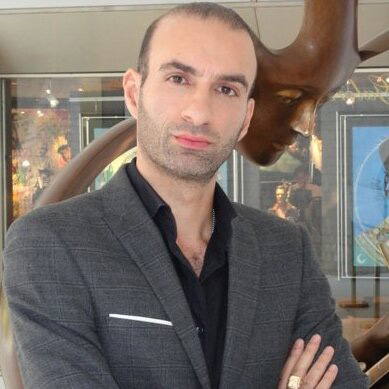
Tehran Book Fair can be a source of correct news about Iran
1402/02/11-13:24
Arshin Adib_Moghaddam, London University professor, says Tehran International Book Fair can be a source for providing real news about Iran.
According to the news headquarters of the 34th Tehran International Book Fair, a meaning of cultural diplomacy has been introduced as bargaining to reach goals that unite human societies. Achieving these goals is based on common cultural factors between societies. As a rule, countries with a richer culture will have the ability to absorb more. “Book” is an important factor and medium in the dialogue between cultures, and the publishing industry of any country with a long and rich cultural history is a place for these dialogues.
Tehran International Book Fair, which we are on the verge of its 34th period, can be considered an important factor in cultural diplomacy because it is the result of Iran's rich publishing industry. For this reason, the news staff of this period of the exhibition decided to ask about the Tehran International Book Fair in a conversation with some of the world's great intellectuals and scholars, and it can be said that the goodness of these conversations is the introduction of this fair to these thinkers.
In this respect, Arshin Adib_Moghaddam, Professor in Global Thought and Comparative Philosophies in School of Oriental and African Studies (SOAS), University of London and Co-Director SOAS Centre for AI Futures says “Book fairs can do a great deal to communicate, connect and to represent.”
Following is the full text of the interview:
Q: Are you familiar with Tehran Book Fair? If your answer is yes, how did you get to know it? If you are not familiar with it, how can Tehran Book Fair be included in the cultural calendar of the world?
A: I have known about the fair for a long time and visited it when I was in Tehran in the late 1990s. The Persian translation of my book “The International Politics of the Persian Gulf” published in Iran by Shirazeh was displayed later on and the fair also came to my attention through an unfortunate event in 2015, when it was reported that my edited book on Ayatollah Khomeini and published by Cambridge University Press (“A critical Introduction to Khomeini”, 2014) was confiscated. This was the first English-language book, that covered Ayatollah Khomeini’s ideas from several angles and it was written by leading scholars on the subject matter. To be a major fixture, such events should be avoided. In more general terms, today’s technological opportunities provide ample ways to connect. For example through multimedia films and/or lectures which could be beamed live online and/or pre-recorded and aired throughout the venue.
Q: In general, what is the position of the book as a cultural commodity in cultural diplomacy?
A: Every book is a dialog. Scholarly books are not only a dialogue, but they are History. They establish, interrogate and capture facts, which is so incredibly crucial in our current age of misinformation and systematic untruths. For instance, everyone remembers Plato, Ibn Sina and Omar Khayyam, but how many remember their contemporary politicians? The point being is that books constitute the cultural archives of humanity, whereas the legacy of most politicians are washed away at the edge of the sea by the waves of history. Furthermore, whilst libraries are increasingly digitised, I am yet to enter an immersive virtual “bayt al-hikmah” that would archive digitally the intellectual history of Iran and the region. In fact, colleagues from the visionary Future Studies Program and I have recently held several sessions on instituting such a digital library under the heading “The House of Second Wisdom” which we deem a necessary project to retain knowledge for future generations.
Q: Every year, cultural events in Iran begin with the Tehran Book Fair, and many people participate in it, and the entire cultural and artistic currents in Iran are somehow related to this exhibition. To what extent can such an exhibition represent the contemporary culture of Iran by reflecting in the media?
A: Book fairs can do a great deal to communicate, connect and to represent. In fact, scholarship on such forms of cultural diplomacy has long established the value of book fairs and art competitions for peaceful dialogues among nations, in particular in a setting such as Iran where there is a lot of misinformation, also from the outside of the country. Probably the biggest book fair in the world, in Frankfurt Germany, was systematically nurtured after the Second World War in order to re-connect post-war Germany to the world through an image of tolerance, understanding and empathy. The Film Festival in Cannes and the Biennale in Venice served similar purposes for post-War France and Italy respectively. If the political situation in Iran allows for it, there is no reason why Persia shouldn’t be able to compete with such illustrious fixtures of the global cultural calendar. But as we all know, that is a big “If”.
Q: If we assume that you are planning to visit the Tehran Book Fair this year, what is the first reason for this visit? Do the mere name of Iran and its civilizational and cultural background attract you to attend the exhibition, or is it the temptation to familiarize yourself with the books produced in Iran's publishing industry?
A: Certainly, to find out what the state of the social sciences and the Humanities is and to understand what is possible and what is not. That boundary is crucial in Iran, and sometimes one finds out more about the state of affairs by reviewing what does not get published.
Q: If you want to prepare a book about the contemporary situation of Iran in the fields of culture, politics, and religion, in which countries would you rely more on the published research and prepare it?
A: My work on Iran was primarily based on field studies in the country, but my books were written in Cambridge and London, as SOAS and Cambridge University are the two places that I am based at. I don’t think that the political situation in Iran would have allowed for these books to be published.... One of the reasons why even Iranian students tend to look for scholarship that is not produced in their country and why they remain suspicious of state-sponsored events is exactly due to that absence of free scholarship. In this way, the strategy of restricting knowledge has been intensely self-defeating, as it disconnects the ruling elite from its societal base. In human history, books and the scholars have had the last word. This is why the archives remember Farabi, Ferdowsi, Ibn Sina and Ibn Rushd, and not the rulers of their day. The truth prevails – A good book fair is a celebration of humanity in its multiple facets, rather than an emblem of a unitary world-view.



 بازگشت
بازگشت





